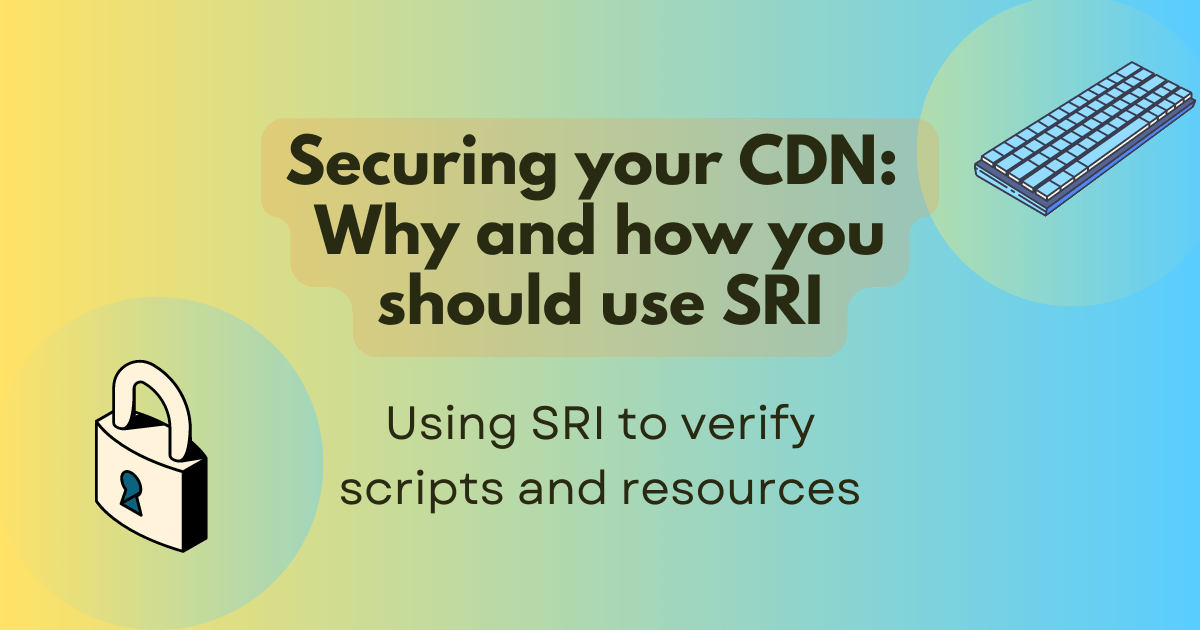Content Delivery Networks (CDNs) are a critical component of modern web architecture, ensuring that content is delivered quickly and efficiently to users around the world. However, security vulnerabilities within CDNs can expose websites to significant risks. This is where Subresource Integrity (SRI) comes into play. SRI is an important security feature that helps protect your website by ensuring that the resources delivered by your CDN haven’t been tampered with.
In this guide, we’ll explore the importance of securing your CDN with SRI, how it works, and how you can implement it to safeguard your web assets and maintain user trust.
The Role of CDNs in Web Performance
CDNs are designed to enhance the performance of websites by distributing content across multiple servers located in different geographical regions. This allows users to access the content from the server nearest to them, reducing latency and improving load times. Whether you’re delivering static files like images, CSS, or JavaScript, a CDN helps ensure that your website runs smoothly, even under high traffic conditions.
While CDNs offer performance benefits, they also introduce potential vulnerabilities. Content delivered via a third-party CDN could be modified or compromised, either intentionally or accidentally, posing a threat to your site’s integrity and security.
What Is Subresource Integrity (SRI)?
Subresource Integrity is a security feature that allows browsers to verify that files fetched from a CDN have not been altered. This is done by comparing the file's hash, which is a cryptographic signature, with the hash specified in the HTML code. If the file's hash does not match the expected value, the browser will block the file from loading.
The purpose of SRI is to protect against situations where an attacker might modify a file on the CDN, inserting malicious code that could harm users or compromise sensitive information. By using SRI, you can ensure that the files loaded on your website are exactly what you expect them to be.
Why Is SRI Important for Securing Your CDN?
One of the biggest risks with using third-party CDNs is the lack of control over the content being served. If a CDN is compromised, attackers can alter the files hosted on the CDN and inject malicious code. This can lead to security breaches, such as cross-site scripting (XSS) attacks, which can steal user data or compromise the security of the website.
SRI mitigates this risk by ensuring that any external resources loaded via the CDN are verified before being used. If the file has been altered in any way, the browser will refuse to load it, preventing any malicious code from being executed on the user’s device.
In addition to protecting against malicious attacks, SRI can also safeguard against accidental changes to files on the CDN. For instance, if the CDN updates a file that is incompatible with your website, SRI will prevent the file from being loaded, avoiding potential disruptions to your site’s functionality.
How Does SRI Work?
SRI works by using cryptographic hashing to generate a unique signature for a file. This hash is then embedded in your HTML code alongside the link to the resource hosted on the CDN. When the browser attempts to load the file, it checks the hash of the file it receives against the hash specified in the HTML.
If the hashes match, the browser will load the file as expected. If they don’t, the browser will block the file from loading, protecting your website from any potential harm. This process happens automatically and seamlessly, ensuring that only the intended version of the file is loaded.
Implementing SRI in Your Website
To implement SRI, you’ll need to generate a hash for each resource that you load from the CDN, such as JavaScript files or CSS stylesheets. You can use various tools to generate these hashes, many of which are available online for free.
Once you have the hash for a resource, you’ll need to include it in the integrity attribute of the script or link tag that loads the resource. This tells the browser to verify the integrity of the file before loading it.
In addition to specifying the hash, you’ll also need to include the crossorigin attribute. This is necessary because the resource is being fetched from a different origin (the CDN), and the browser needs to know how to handle cross-origin requests.
Best Practices for Using SRI with CDNs
When implementing SRI, it’s important to follow best practices to ensure that your CDN resources are properly secured. One key consideration is to always use the strongest available hash algorithm, such as SHA-384, to minimize the risk of hash collisions, where two different files produce the same hash.
Another best practice is to ensure that you’re using HTTPS for all CDN requests. SRI works by verifying the integrity of a file, but it doesn’t protect against man-in-the-middle attacks where an attacker intercepts the file before it reaches the browser. By using HTTPS, you add an additional layer of security that prevents attackers from tampering with the file during transmission.
It’s also important to regularly update the hashes in your HTML code whenever the files on the CDN are updated. If the CDN changes a file (for example, a new version of a JavaScript library), the hash will need to be updated in your HTML as well to ensure that the file is still loaded correctly.
Challenges of Using SRI
While SRI is a powerful security feature, there are a few challenges to consider when implementing it. One of the main challenges is maintaining up-to-date hashes for all the resources loaded from the CDN. Each time a file is updated on the CDN, you’ll need to generate a new hash and update your HTML code accordingly.
Another potential challenge is compatibility. Not all browsers support SRI, so it’s important to ensure that your website functions properly even in browsers that don’t support this feature. However, most modern browsers do support SRI, so this should only be an issue for a small percentage of users.
When Should You Use SRI?
SRI should be used whenever you’re loading external resources from a CDN, especially for critical resources like JavaScript libraries or CSS files. These resources are often targeted by attackers because they have the potential to execute code on the client side, making them a prime vector for attacks.
Using SRI for all external resources ensures that your website remains secure, even if the CDN is compromised or the files are altered. This is particularly important for websites that handle sensitive data, such as e-commerce sites or platforms that require user authentication.
Monitoring and Maintaining Your CDN Security
Once you’ve implemented SRI, it’s essential to monitor and maintain your CDN security regularly. This involves checking for updates to the resources hosted on the CDN and ensuring that your hashes are always up to date. You should also periodically review your CDN provider’s security policies and practices to ensure that they are following industry best practices.
In addition, consider using automated tools that can scan your website for vulnerabilities and alert you to any potential issues with your CDN or SRI implementation. These tools can help ensure that your website remains secure and that any changes to external resources are quickly identified.
SRI and the Future of Web Security
As the web continues to evolve, security features like SRI will become increasingly important in protecting websites from emerging threats. The ability to verify the integrity of resources loaded from external sources is a critical component of web security, especially as more websites rely on third-party CDNs for performance optimization.
Looking ahead, we can expect to see further developments in SRI technology, as well as broader adoption of security practices that protect both website owners and users from potential threats. By staying informed about the latest security trends and best practices, you can ensure that your website remains safe and secure in an ever-changing digital landscape.
Securing your CDN with Subresource Integrity is a crucial step in protecting your website from potential threats. By ensuring that the resources loaded from a CDN have not been tampered with, SRI helps safeguard your site’s integrity and user trust. Implementing SRI may require some effort, but the added layer of security it provides is well worth the investment.
In a world where cyber threats are constantly evolving, taking proactive measures like SRI can make all the difference in keeping your website secure. Whether you’re running a small personal blog or a large e-commerce platform, using SRI to secure your CDN is an essential best practice for modern web development.
FAQs
What is Subresource Integrity (SRI)?
SRI is a security feature that ensures external resources loaded from a CDN haven’t been altered by comparing the file's hash to the hash specified in the HTML code.
How does SRI enhance website security?
SRI protects against malicious modifications to files on a CDN by verifying the file’s integrity before it is loaded by the browser.
Do I need to update my SRI hashes regularly?
Yes, whenever a file on the CDN is updated, you’ll need to generate a new hash and update your HTML code to ensure the file loads correctly.
Does SRI work on all browsers?
Most modern browsers support SRI, but some older browsers may not. It’s important to ensure your website functions properly even in browsers that don’t support SRI.
Should I use SRI for all CDN resources?
Yes, especially for critical resources like JavaScript libraries or CSS files, to protect against potential security risks.























